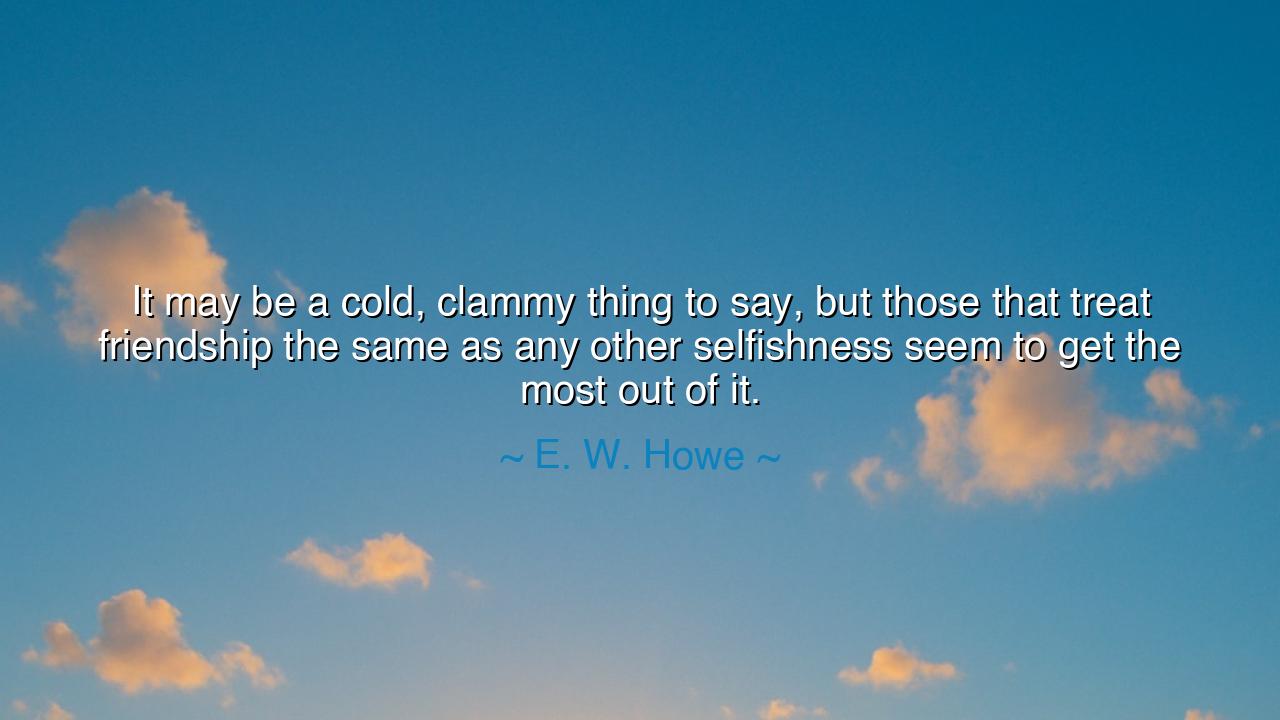
It may be a cold, clammy thing to say, but those that treat
It may be a cold, clammy thing to say, but those that treat friendship the same as any other selfishness seem to get the most out of it.






In the words of E. W. Howe, we find a truth that chills the spirit and yet illuminates the workings of the human heart: “It may be a cold, clammy thing to say, but those that treat friendship the same as any other selfishness seem to get the most out of it.” At first hearing, this utterance strikes like winter wind — sharp, unfeeling, even cruel. But beneath its frost lies a revelation of great clarity. Howe speaks not to the death of compassion, but to the realism of the human bond. He reminds us that friendship, though noble in name, is still a vessel steered by desire — that those who understand and accept the selfish nature of man may sail further upon its waters than those who dream blindly of selfless perfection.
In ancient times, philosophers grappled with the same paradox. The Greeks spoke of philia, a friendship that was both virtuous and beneficial. Yet even Aristotle, that wise student of the soul, confessed that the truest friendships are built upon mutual advantage — that each gives, but also receives. Thus, Howe’s words echo across the ages: that those who recognize their own interest within friendship, and do not cloak it in false sanctity, are less likely to be disillusioned when the tides of affection shift. To know the nature of a thing is to master it. To know that friendship carries self-interest within its heart is to wield it wisely.
Consider the tale of Niccolò Machiavelli, who wrote not of idealism but of what is. Exiled and betrayed by those he once served, he came to see the nature of men as practical, not pure. Friendship, he observed, endures only so long as it serves a purpose. When power changes hands, so too does loyalty. And yet, those who understood this truth — who treated alliance as both emotional and strategic — often survived where others perished. It was not cynicism but clarity that preserved them. So too in our lives: those who give love wisely, without illusions, find it returned more steadfastly than those who pour out devotion heedless of measure or balance.
There is a cold wisdom in such awareness, but not a cruel one. To understand that friendship, like all human dealings, contains self-interest is not to abandon kindness — it is to strengthen it. When we give, knowing we too desire something in return — whether it be trust, joy, or belonging — we give with open eyes, not blind ones. The ancients taught that the wise man knows the limits of his generosity and guards his peace like a sacred flame. To do otherwise is to burn oneself for those who will not stand near the warmth.
And yet, we must not take Howe’s words as an invitation to selfishness alone, but as a reminder to temper idealism with truth. The heart that gives without thought is noble, but the one that gives without discernment is doomed to sorrow. True friendship is not the absence of self-interest; it is the harmony of mutual benefit — where each finds joy in the other’s gain. When both friends understand this balance, neither becomes a fool, and both flourish in the exchange.
We see this truth in the story of Andrew Carnegie and his mentor Thomas Scott. Carnegie began as Scott’s assistant in the railways, and their bond was both personal and practical. Each saw in the other an advantage — one offered opportunity, the other talent. Yet from this alignment of interest grew deep loyalty, mentorship, and eventual friendship that endured beyond profit. They proved that even selfish beginnings can blossom into something enduring when tempered with gratitude and respect. Such is the alchemy of human connection — selfishness refined by affection becomes alliance, and alliance refined by time becomes love.
Thus, the lesson passed down to us is this: do not curse the selfish element in friendship — understand it, guide it, and let it serve higher purpose. Expecting friendship to exist in pure selflessness is to invite heartbreak. Instead, cherish those whose interests align with your own, and nurture that bond through fairness, honesty, and shared purpose. For even the mightiest trees draw strength from roots intertwined below the soil, unseen yet vital.
So, dear listener, when next you give your trust, do so not blindly but wisely. Let your heart be open, yet your mind discerning. Know that friendship, like all human endeavor, is a dance of giving and receiving. The wise do not scorn this truth; they master it. In doing so, they find what Howe saw through the mist of human frailty — that those who understand the nature of friendship, even in its selfishness, will indeed “get the most out of it,” and walk the world neither deceived nor alone.






AAdministratorAdministrator
Welcome, honored guests. Please leave a comment, we will respond soon